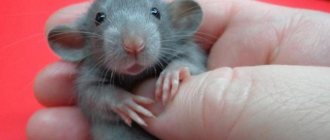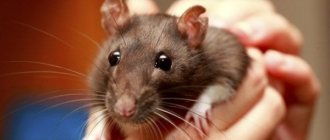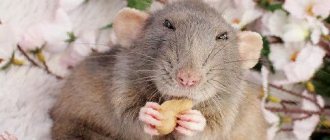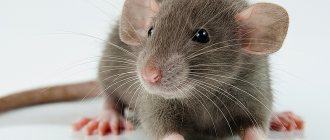Prohibited Products
Any prepared food, especially fried or spicy food, is prohibited for rats; canned food; sweet; alcoholic drinks; sweet drinks.
It is also undesirable to feed your pet from the owner's table: the food sold in specialized stores is already balanced and includes all the necessary vitamins. If you give your pet food from the table, the animal may refuse its food. Afterwards, it will be very difficult to wean the animal off junk food.
If you want to pamper your pet with fruits or vegetables, it is very important that they are in season, otherwise there is a risk of poisoning from harmful pesticides that are used for quick growing and long-term storage.
Grains and cereals - which ones should you avoid?
Grains form the main diet of rats, but it is necessary to know which grains can be fed and which cannot.
- Wheat is allowed for rats, but requires supplementation with other types of grains. Very high in calories. Wheat can be diluted with rice, buckwheat, corn and other grains.
- Buckwheat is considered dietary, has few calories, and can be added to the diet of rats.
- Corn, on the contrary, is high in calories; it is advisable to give it less often than others and as an additive to other grains.
- Oats - can cause fermentation, so it can be given, but in small quantities.
- Rice is considered to have little nutritional value, so it is advisable to feed either wild or brown rice.
- Semolina does not contain anything beneficial for the rat’s body, and veterinarians advise excluding it from the diet.
- Millet or barley - they can be given in the form of ready-made porridge for weakened animals, or for nursing offspring; adults can sometimes be given for variety.
Can pet rats eat watermelon?
The basis of a rodent's diet should be grain mixtures. Fresh vegetables and fruits are added to the diet.
Watermelons are included in the list of approved food for decorative rats.
However, there are points that you definitely need to know before offering the product to an animal. Remember that early varieties of watermelons often contain a lot of nitrates, which can poison your pet. The same applies to those fruits that are sold out of season. Therefore, it is advisable to give watermelon to rats in August and the first half of September.
Of course, no one is insured that a product containing nitrates will not come across during this period, but still the chances of getting poisoned will be much lower.
Vegetables and greens
Vegetables are very healthy and are allowed to be consumed daily, but in small quantities.
- Cabbage - any kind is undesirable for consumption, because... causes fermentation.
- Broccoli – can be given as an occasional treat.
- Radishes/turnips/radishes and some legumes (beans, lentils) cause increased discomfort due to gas formation, so their consumption is undesirable.
- Carrots/zucchini/pumpkin are very healthy, rich in vitamins, so their consumption is recommended.
- Eggplants/artichokes – only boiled ones are allowed; when cooking for an animal, adding salt or spices is not required.
- Cucumbers/beets – can cause stomach upsets in the form of diarrhea, so their consumption is undesirable.
- Potatoes have no value and are even prohibited in their raw form.
- Dill/parsley/celery, etc. are very beneficial for the digestion of rats, so it is advisable to add greens to their food daily.
- Tomato/sorrel – contain acid, consumption by rats is undesirable.
Meals during special periods
Pregnancy
To prevent the expectant mother from getting sick during or after pregnancy, she needs to be fed properly. Poultry, fish, chicken cartilage, apples, cottage cheese will be useful. Onions, garlic, peppers, grapes and raisins should be excluded from the diet.
After a tiring birth, you can also help the nurse by making weak tea with half and half cream. This will restore her strength and improve her milk supply. It’s just better not to place the bowl with the mixture far away, otherwise the weakened mother may not be able to crawl to the moisture and quench her thirst with her own children.
Baby rats
Babies need special nutrition for proper development. If suddenly for some reason they are left without a mother, then you need to carefully feed them with goat’s milk from a syringe with a catheter (it contains more fat, which is important for the newborn body), and later with formula.
After each feeding, be sure to give a drop of Biovestin, which prevents many digestive diseases. After three weeks, when the pups' eyes open, you can give children's hypoallergenic porridge or small buckwheat added to the mixture. And you shouldn’t limit their diet as they grow older, because children always need a lot of food, as they lead an active lifestyle.
Fruits
- Citrus fruits are prohibited for consumption, because may cause allergic reactions due to increased acidity. A piece of tangerine is allowed as a treat (sometimes).
- Forest/garden berries – the acidity of the berry must be taken into account. Cranberry is very useful, but you need to give it a little and watch the reaction.
- Pear – may cause fermentation, should be given occasionally.
- Plum – has a laxative effect, its use in the diet of rats is undesirable.
- Watermelon/melon – a small amount is allowed, but must be seasonal.
- Dried fruits can also provoke fermentation; they are given occasionally as a tasty treat.
It is important to know that eating seeds from berries and fruits is unacceptable; they are very harmful to animals and can cause poisoning.
Mushrooms
If you use mushrooms that are edible to humans, they are also safe for rats. It is recommended to serve mushrooms cooked to kill any microbes that may be on them after processing.
Additionally, it is important to feed mushrooms to rats in moderation. A small amount of mushrooms will not harm your rat and can be a tasty and healthy snack. Mushrooms have also been shown to help prevent tumors and infections in rats, so it might be a good idea to give them as a treat occasionally.
But if you feed your rat a lot of mushrooms, it can cause many side effects. Excessive feeding of mushrooms can cause gas, diarrhea and some other digestive problems in your rat. For this reason, it is best to feed mushrooms to rats in moderation.
This will diversify your rat's diet and prevent many health problems.
Milk products
All dairy products will be beneficial to your rat's health, but it is important to be aware of the possibility of a lactose allergy. It is advisable not to give pure milk, but other fermented milk can be given, but without fanaticism, you need to introduce new products little by little, observing the reaction. It is also undesirable to consume homemade sour cream/cream/cheese; often such products have a high fat content, which can cause digestive disorders.
Possible and useful:
- cottage cheese;
- fermented baked milk;
- pure yogurt;
- kefir.
Any fermented milk product should have no more fat than 4%. When it comes to low-fat products, it is advisable to choose non-perishable or children's dairy products.
Criteria for choosing a watermelon
The product that your pet rodent will be treated to must be fresh and ripe. You should not give a decorative rat:
- Unripe or rotten watermelon.
- The smell of the fruit pulp should be fresh and pleasant, without obvious foreign aromas.
- A good watermelon has uniformly colored flesh and should not have dark or light spots or depressions.
- You should not feed it to an animal if the inside is of a light glossy color with yellow-white streaks. This indicates that the watermelon is saturated with nitrates.
There is a stereotype that all rats should eat waste and rotten foods, just like their wild counterparts do. However, pet rats have nothing to do with them and need a normal and proper diet.
When choosing treats for your pet rat, we must not forget that many foods can be harmful to it. Watermelon can be given to an animal infrequently. Before offering your rat anything new to eat, you need to be completely sure of its safety.
Great article 16
Boiled eggs on rats' menu: benefit or harm?
Domestic rats enjoy eating boiled eggs. Therefore, some owners treat their little pets to this delicacy almost every day, believing that it is good for their body and gives their fur shine and a well-groomed appearance.
This product is truly a healthy and nutritious treat for cute animals, but if used incorrectly, it can be harmful to the health of the animal.
You can avoid this by adhering to several rules:
- Rodents may be allergic to this product. Therefore, when offering eggs to rats for the first time, it is necessary to observe whether the animal has an allergic reaction (itching, redness of the skin);
- adult pets are fed a boiled egg no more than once a week;
- small rats can be given such a treat once every three to four days;
- Rats prefer boiled egg yolks to whites. But the animal may choke on the yolk and before feeding it is advisable to dilute it with a small amount of water or milk;
- It is not recommended to give fried eggs to pets, as they are prepared with the addition of sunflower or vegetable oil, which is harmful to the liver of rodents;
- We should also not forget that these foods are quite high in calories and their excessive consumption can lead to the development of obesity in the animal.
Important: rodents should not be fed salty, hot or spiced foods, so you should not give them eggs from your table, for example, stuffed or covered in sauce.
Store-bought treats
Store-bought treats cause far fewer problems. Because specialized products are made from ingredients that are completely safe for rats. Also on the packaging is all the necessary information - how to store, under what conditions, how much to give to the rat and at what interval. The following store-bought treats are most popular among rat owners:
- Crispy Little One sticks with puffed rice, peanuts and walnuts. The composition also contains wheat, oats, millet, and corn. The delicacy is enriched with a vitamin and mineral complex.
- Multi-colored vegetable and alfalfa balls from JR Farm. The color will tell you what the delicacy is made of. Red balls are from beets, orange are from carrots, green are from alfalfa, yellow are from corn.
- Mealworm ONTO. Rich in protein and fats. Just 1 piece is enough to pamper your pet. Rich in vitamin B12, necessary for normal hematopoiesis. Strengthens the health of the liver, gastrointestinal tract, and also improves immunity.
- Branches of the Kuban apple tree. They have a pleasant taste and aroma. Designed for regular grinding of growing teeth. Other manufacturers offer similar treats for rats (currant, viburnum, willow, birch branches).
- fruit crackers . It is based on a wooden stick and also has a clamp for installation inside the cage. The baked sticks consist of a mixture of cereals, apple and apricot. Contains minerals and vitamins A, D3. Free from artificial colors and flavors. They fill your pet with energy and improve their mood.
- Drops for rodents SANAL. They contain honey and milk, so rat owners are afraid to buy them for their pets. And it’s completely in vain - all ingredients undergo multi-stage purification, during which allergens are completely destroyed. Also contains extracts of fruits and vegetables, vitamins B, C, and minerals (copper, potassium, zinc, manganese).
Many store-bought treats are sold with the general label “for rodents.” Therefore, before purchasing, it is better to make sure that the treat is suitable for rats. The necessary information can be obtained from the seller or on the back of the package.
This is not a complete list of store-bought treats. If desired, you can find other equally tasty and healthy delicacies for decorative rats in pet stores.











